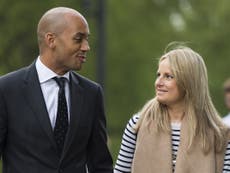Poor Chuka Umunna. Seemingly singled out for examination, there was, it is said, something about him that intrigued tabloid newspaper editors. True enough, he did not fit the obvious Labour leadership candidate model – although if there was an heir to Tony Blair in the pack, it was he.
The first high-profile public appearance of Umunna’s girlfriend piqued that interest and was followed by approaches to members of her family, as well as his. To what extent this was legitimate depends on your point of view. There are perhaps two key ways to approach the issue.
First is to see it through the prism of media ethics. What is permissible in terms of journalistic approaches to individuals who are not directly the subject of a story? Fundamentally, there is no restriction on a journalist seeking comment from any individual about any matter, as long as the person isn’t grieving, ill or a child. “Door-stepping” has some deeply negative connotations, but greater limitations on journalists’ ability to ask questions would have consequences for press freedom.
There are, of course, caveats. If a person says they don’t wish to be asked more questions, a journalist must desist. Persistent pursuit of a subject is prohibited. Claims of Umunna’s mother being “chased” down the road might fall into that category, although details are unclear. All in all, though, while the scrutiny was unwelcome, there is little to suggest that codes of conduct were substantively breached in the desire to unearth Umunna’s inside story.
As several commentators have noted, the other way to consider Umunna’s withdrawal is in the wider context of what type of politics we want in this country: one that is obsessed with personality or that focuses on policy? To some extent, this debate is based on the shaky argument that personality was once of less interest to the public than it is now. But the character of politicians has always mattered: it is, after all, personality that “sells” policy. Famous election victories in 1945 and 1997 were enabled in no small part by the very different personalities of Attlee and Blair.
The real problem is not that personality and private life have become vastly more important. Rather, that most people are too time-poor to consider matters of policy in great detail. Changing that is beyond any question of press ethics.
The European question: getting the facts straight
For those who can spare the time to become immersed in political debate, the next two years will be dominated by discussion of Britain’s role in Europe prior to a referendum in 2017.
Knowledge of European institutions is poor in this country. My bugbear is the regular erroneous linking of the European Court of Human Rights to the EU.
An item in last week’s Independent reported the views of a betting expert on the likely outcome of a referendum. Britons, he noted, tend to back the status quo; as an exception to the rule, he cited the 1975 referendum in which we voted for “change”, to join the European Economic Community. No, no, no! By 1975, Britain was already a member: the referendum was over whether we should stay in after Labour’s renegotiation of terms. The margin of victory for the “yes” camp was substantial.
Many column inches will be devoted to the European question by this paper in the coming months. If we get things wrong, we will set the record straight – so please tell us if you spot a mistake.
Twitter: @willjgore






Join our commenting forum
Join thought-provoking conversations, follow other Independent readers and see their replies